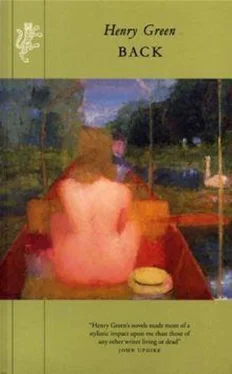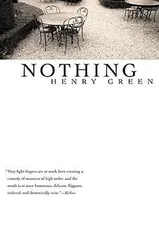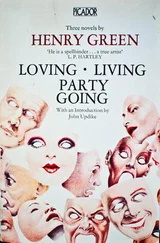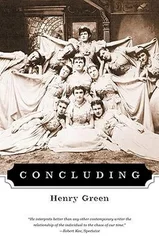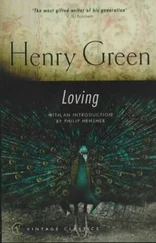He made himself study the living room. He forced himself to stay clear. And he saw the cat curled up asleep. It didn’t even raise its ears. Then, at the idea that this animal could ignore crude animal cries above, which he had shut out with his wet palms, he nearly let the horror get him, for the feelings he must never have again were summoned once more when he realized the cat, they came rumbling back, as though at a signal, from a moment at night in France. But he won free. He mastered it. And, when he took his streaming hands away, everything was dead quiet.
Finally he heard her coming, at last. There could be no doubt. Instinct made him switch out the lamp. He waited in darkness.
When she got to the door, she turned every light on in this room. He sat up. “He’s gone,” she said, in a great voice. “It’s over.” She stood there proud, grave, and lovely.
“I’ve given her something to make her sleep,” she explained, as she came over in her red dressing-gown. He could not speak. “Here, drink this,” she said, “it’s a drop of whisky.” She did not mention that she had added a sleeping draught, to make him sleep also. In the wide sleeves her arms were like the flesh of peaches.
He took the glass. It was when he saw her as she was looking at that moment, when, finally, she brought him peace, that he knew he really loved her. But he could not tell a word of this.
She left in a few minutes, and did not come back that night. He slept like the dead. Indeed, he snored so loud he shook the springs.
A day or so later, he was hauled up before Corker, who took him through those deliveries of the ten parabolam plants, in great detail. The man seemed to be satisfied because at the end he said, “Yes that’s quite good,” but then he added, “Now, Charley, I want to speak about yourself.”
“Yes sir?”
“I’ve been observing you.”
“Yes sir.”
“What I’ve to say isn’t easy for me, Summers.” To revert thus to Charley’s surname was a sign of trouble. “I think I told you before that in this war the civilians have had some. Why only the other afternoon I was obliged to send one of our typists away, out of the estimating department, for a week’s rest. I can’t remember her name at the moment. Yes I do. Miss Pease, of course. It’s not often I can’t recall a name.” He paused, as if waiting for Charley to confirm this, but the young man, who lacked the self-confidence, missed his opportunity. “But I’ve been observing you,” Mr Mead continued. “It’s not altogether your case taken on its own merits, I’m thinking of the rest of the staff who joined up, and who’ll be coming back to us some day,” he said, leaning backwards in the chair with a judicial expression. Once more he paused, once more Charley did not find it in him to reply.
“With your case,” Mr Mead began again, “I’ve a feeling I’m not getting your best at your work, not all your attention, not all of you, Summers. When everything’s said and done, this is a grand opportunity for you, you know. You’re the first we’ve had returned to the old firm, and I put you in a big position for a man of your experience, which hasn’t been all that large. And what do I find after I’ve watched carefully, for I’ve kept an eye on you, mind? Of course I know there was a bit of bad luck with that girl the Ministry sent. She was no more help to you than a sick headache. In fact, I’ll go this far. She was a disadvantage, Charley, and I give you credit for putting up with her like you did. No, it’s not that is worrying me. It’s yourself, and all the young fellows like you. Have women gotten hold of you, Summers? Is that it?”
“Me sir?” he asked.
“Yes you,” Mr Mead insisted. “You’re the only other person in this room, aren’t you? But I’ll tell you why. I’ve known Rob Jordan all my life, and a year or two back, when we were talking, he got me interested in the Reform of Prisons League. I’ve been to several of their meetings since. It may not be a very pleasant thing to say in mixed company, Summers, but we’re speaking as man to man now. It’s sex is the whole trouble. There you are. Sex.”
“Sex sir?” Charley echoed.
“See here, Summers, I’ve a right to expect a bit of co-operation from your quarter, now, haven’t I? It’s no good your telling me you never came across that problem, not in the four years you had behind barbed wire. Dammit man, there’s things we all feel. It’s nature.”
“You mean girls,” Charles said blankly.
“What else?” Mr Mead enquired, in a savage voice.
“My girl died the week I got taken prisoner,” Charley announced. It was a measure of how far he had forgotten Rose that he was able to say this, calm as calm, and, of his old need to cover up, that he did not now mention Nance.
“Did she?” Mr Mead muttered. He had been flung off balance. “I see. That’s different, then. I’m sorry to hear that, Charley.”
“Her dad joined her just the other day. I was down there when it happened.” Charley spoke with an extraordinary tone of innocence.
“What did he die of?”
“He had a second stroke.”
Mr Mead was always able to talk medical details for hours. He drew out every little thing Charley knew about Mr Grant’s illness. When he could get no more, and he had said, “It’s got to come to all of us, some day,” a silence fell.
“Now, my lad, to return to yourself,” he said. “I may have been mistaken where you were concerned. I’ll be perfectly frank and open with you. No one said a word to me, mind, but somehow I got the impression, right or wrong, that there was a little matter of account between that typist of yours we had to get rid of, between the two of you. I realize now I may have been mistaken. But in this life, Charley, and I’ve had a lot of experience, it’s either the one thing, or the other. To put it in a nutshell, after the bad time you’ve had, you want to marry and settle down. Children of one’s own, that’s the thing. And I’ll tell you this. It’s not a promise, because there’s others besides me to consider, but, when you do put up the banns, you just come along, and we’ll see what we can arrange about giving you a rise.”
Then a ludicrous accident occurred. Charley gulped, quite in the usual fashion, but swallowed the wrong way, so that he choked. He coughed once or twice, and after that held his breath, going red in the face as he did so. It crossed his mind that Mr Mead might believe he was laughing at him, which was precisely what Corker had begun to suspect. Charley’s eyes filled with tears. Mr Mead cleared his own throat. Charley’s eyes began to start out of his head, and, for every millimetre they protruded, Corker’s mounting anger pushed his out an equal distance. At last the younger man grew desperate for lack of air, half rose out of his seat, made as if to bang himself on the back. Upon which Mr Mead tumbled to it, and heartily thumped him.
When Charley had recovered, Mr Mead said gravely,
“It can be very serious, that can.”
He waited for encouragement, but the young man was still gasping.
“People have died of that,” Mr Mead was beginning, when his telephone rang. He picked up the receiver. He listened. He said “Yes Muriel?” from which Charley was fairly certain that Corker’s goitred wife was on the other end. Again, a savage expression spread over Mr Mead’s face.
“You tell that kid of mine I’ll tear the heart right out of him when I get home,” he shouted, almost at once. “What’s that, Muriel? I don’t care if he is seventeen. What? I can’t correct my own son, can’t I? Look, I don’t care if he is going into the army directly, it’s discipline he wants now, or it’ll be the worse for him later on when he’s enlisted. Muriel. Now Muriel …” and there was a click over the phone, Mrs Mead had rung off. He put the receiver back. He mopped his brow. “Women,” he muttered, “women.”
Читать дальше
